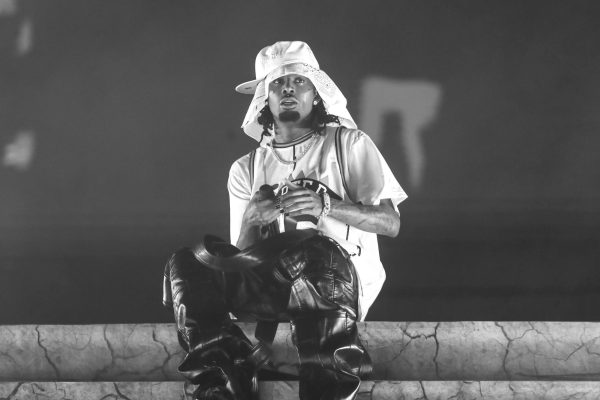Bethesda Delivers Satisfying Narrative, Gameplay in Wolfenstein II
Editor’s note: This article contains discussion of Nazism and child abuse.
The opening of a game is a thematic statement, meant to tease where a story might go without showing all of its cards. So when Wolfenstein II begins not with a bombastic scene of war like its predecessor did, but by delving into the consequences of conflict and the family history of its main character, one must take a moment and examine what’s going on.
Wolfenstein II: The New Colossus, which was released on Oct. 27 by Bethesda Softworks and developed by MachineGames, is the sequel to one of the biggest gaming surprises of 2014. The first Wolfenstein was set in an alternate history where the Nazis had won WWII and conquered the world. Lauded by players and critics alike for its storyline and combat, it was a flawed masterpiece. Though it was uneven in places, it was still a wonderful gaming experience at a time when well-crafted single-player shooters were on the decline. The latest iteration of the game — advertised with slogans like “Make America Nazi-Free Again,” “There is only one side,” and “These are not ‘fine people’” — promised a darkly relevant narrative that emphatically rejects the rise of white nationalist speech and action in the U.S.
The narrative of Wolfenstein II is set immediately after the end of the first game, wherein the main character, B.J. Blaskowicz, was left severely wounded. From that starting point, the narrative goes some truly unexpected places. The game grapples with serious themes including abuse, racism, and the inherent flaws of the U.S. even before it was taken over by Nazis in-narrative, all the while embracing absurd and hilarious moments. It would seem that these two tones would clash, creating a dissonant tone, but they only serve to heighten each other. Watching moments from B.J.’s childhood and seeing the abuse he endured at the hands of his father is horrific. Later, listening to a character come up with a plan to get B.J. to a Nazi Space station on Venus made me laugh louder than I had all year. The game makes sure to provide adequate time for harsh and dour moments to earn their weight, exploring what they mean instead of glossing over them. It creates a sense of grounding that validates the game’s more outlandish moments.
MachineGames has also established one of the best casts of characters in any game I’ve played. Grace, a pregnant Black woman and a charismatic resistance leader on the front-line, and Sigrun, a recent ex-Nazi, to name only a couple, are compelling in the cutscenes and in the conversations you hear while exploring your hub. And since the game features two possible timelines depending on who you decide to save in a prologue scene, I’m already excited to go back and see how the dynamics of the cast change from playthrough to playthrough.
Beyond the narrative, Wolfenstein II boasts a satisfying combat system. The way that you choose to approach the game affects your experience with the world in satisfying ways. Rely on stealth kills and you move more quietly, but choose dual weapons and you deal more damage. It’s a simple system that is genius in its execution. That, along with the subtle leaning mechanic that allows you to peek around corridors, are the hallmarks of the gameplay, resulting in an engaging style that requires constant attention.
However, some smaller game elements are less satisfying. Wolfenstein II is very difficult to play. While part of that comes from enemy placement and the non-regenerating health system — which contribute to an enjoyable game experience — odd and perplexing decisions about other elements of gameplay also add to the difficulty. Some items are picked up automatically, while others require you to pick them up manually. This leads to is running around while mashing the interact button so that you can pick up the health, armor, and ammunition you desperately need. Furthermore, the game provides scant feedback when you take damage. Most of the time, the screen doesn’t change — or colors only slightly shift to let you know when you’ve been hit — so death can come as a surprise. At times I felt frustrated, as the tighter environments felt constrictive compared to the wide open streets of New Orleans that I got used to early in the game.
But those grips are not enough to detract from an incredible game. The combat still feels satisfying, sneaking around is fun, and the narrative is one of the best that I’ve experienced in a game. Especially in our current political climate, a game like Wolfenstein II about overthrowing the evil in America is a timely and cathartic narrative to partake in.






